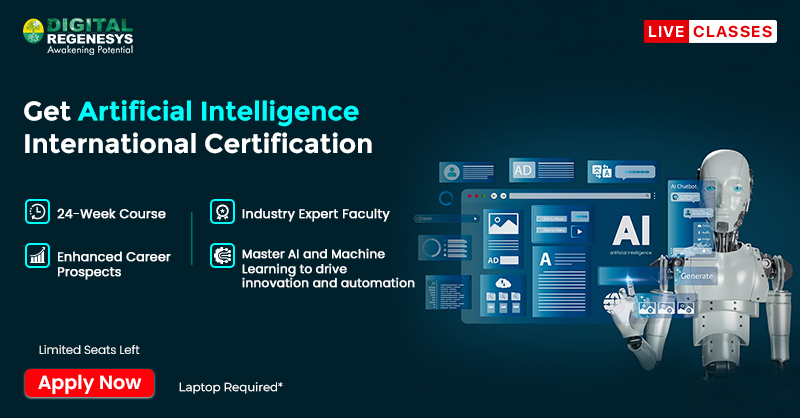Roadmap to Becoming an AI/ML Expert in India

Artificial Intelligence and Machine Learning are reshaping the professional landscape in India, influencing sectors such as IT, finance, healthcare, and education. Organisations increasingly rely on AI and ML solutions to improve efficiency, gain insights, and enhance decision-making processes. With the demand for skilled professionals rising, learning AI/ML can significantly boost career opportunities and salary potential.
In this article, we will explore a step-by-step roadmap to becoming an AI/ML expert in India, including skills, specialisations, practical experience, and certifications.
Step 1. Understanding AI/ML Fundamentals
Building a strong foundation in Artificial Intelligence (AI) and Machine Learning (ML) is the first step toward becoming an expert. AI is the broader field that enables machines to perform tasks intelligently, while ML focuses on algorithms that learn patterns from data. A specialised branch of ML, Deep Learning, uses neural networks to solve complex problems such as image recognition and natural language processing.
Some of the main concepts include:
- Supervised learning – Training algorithms using labelled datasets to make predictions or classifications.
- Unsupervised learning – Identifying hidden patterns or structures in unlabelled data.
- Reinforcement learning – Teaching algorithms to learn through trial and error, guided by feedback and rewards.
For Indian learners, online platforms, academic courses, and structured learning such as the Digital Regenesys Certification Course in Artificial Intelligence offer accessible ways to develop these foundational skills.
Step 2. Develop Programming Skills
Proficiency in programming is essential for AI and ML, as it enables the implementation of algorithms, data handling, and effective model building. Python is widely used for its simplicity and powerful libraries. Even if you have little or no programming experience, structured courses like the one offered by Digital Regenesys can help you acquire the necessary skills through practical applications.
Key programming tools include:
- Python – Libraries such as NumPy and Pandas for data handling, Matplotlib for visualisation, and Scikit-learn, TensorFlow, or PyTorch for machine learning and deep learning.
- R Programming (Optional) – Useful for statistical analysis and specialised data tasks.
Hands-on experience through projects, coding challenges, and maintaining a portfolio ensures practical understanding and builds professional credibility.
Read more on How to Start Studying Artificial Intelligence? here
Step 3. Data Handling and Analysis
Data is the foundation of AI and ML. Without clean, well-structured data, even the most advanced models will fail. Learning to collect, clean, organise, and analyse data is essential for building reliable AI/ML solutions. Structured courses can help beginners gain these skills step by step while applying them to real-world projects.
Indian learners can work with a variety of datasets, including:
- Government data – Portals such as the Open Government Data Platform provide official datasets for research and analysis.
- Financial data – Stock market information from NSE and BSE helps build predictive models for finance.
- Healthcare and education data – Useful for building AI solutions in public health and learning analytics.
Step 4. Build a Portfolio
Practical experience is a crucial step in becoming an AI/ML expert. A strong portfolio demonstrates the ability to apply theoretical knowledge to real-world problems, making learners more competitive in the job market. Structured courses often include projects that can be incorporated into a portfolio, helping showcase skills effectively.
Project ideas include:
- Predictive Analysis – Build models to forecast trends, such as sales, stock prices, or customer behaviour.
- Optimisation Projects – Develop AI solutions to enhance processes such as traffic flow, supply chain efficiency, and resource allocation.
- Sentiment Analysis – Analyse text from social media, reviews, or surveys to identify opinions and trends.
Beyond course projects, learners can also strengthen their portfolio by:
- Participating in Competitions and Hackathons – Gain real-world experience and visibility.
- Contributing to Open-Source Projects – Demonstrate coding skills and collaboration on public projects.
- Showcasing Practical Work – Include detailed project reports, code samples, and visualisations to highlight applied skills.
Read more on Why Study Artificial Intelligence? here
Step 5. Network and Industry Exposure
Building connections with peers, mentors, and industry professionals is a vital part of developing an AI/ML career. Networking not only provides guidance and support but also opens opportunities for collaboration and career advancement.
Practical ways to gain exposure include:
- Joining AI/ML Communities and Forums – Engage in discussions, ask questions, and share knowledge with like-minded learners and experts.
- Attending Webinars, Workshops, and Conferences – Stay informed about the latest trends, technologies, and best practices.
- Pursuing Internships or Research Projects – Gain hands-on experience and understand how AI/ML is applied in real-world scenarios.
Step 6. Continuous Learning
AI and ML are rapidly evolving fields, and keeping skills up to date is essential for long-term success. Continuous learning ensures that professionals remain competitive and can effectively tackle emerging challenges.
By embracing continuous learning, professionals can adapt to technological advancements and maintain a strong presence in the AI/ML industry.
Some strategies for staying current include:
- Subscribing to Newsletters, Blogs, and Research Portals – Receive the latest updates, case studies, and industry insights.
- Reading Research Papers and Case Studies – Understand cutting-edge developments and best practices.
- Experimenting with New Tools and Techniques – Apply new frameworks, libraries, or algorithms through personal or course projects.
Read more on Why Invest in an Artificial Intelligence course? here

Conclusion
Becoming an AI/ML expert in India requires dedication, structured learning, and hands-on experience. Starting with fundamentals, progressing through specialisations, and building a portfolio leads to strong career opportunities. Continuous engagement with emerging trends and industry practices further strengthens expertise.
Learners ready to embark on this journey can start with the Digital Regenesys Certification Course in Artificial Intelligence, gaining a comprehensive, practical, and industry-relevant skillset. Explore the course today on the Digital Regenesys website.
Last Updated: 15 October 2025
